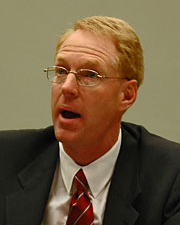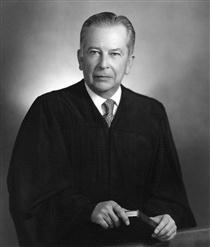Alimony,also called aliment (Scotland),maintenance,spousal support and spouse maintenance (Australia),is a legal obligation on a person to provide financial support to their spouse before or after marital separation or divorce. The obligation arises from the divorce law or family law of each country. In most jurisdictions,it is distinct from child support,where,after divorce,one parent is required to contribute to the support of their children by paying money to the child's other parent or guardian.

Scott Milne Matheson Jr. is a United States circuit judge of the United States Court of Appeals for the Tenth Circuit. He has served on that court since 2010.
In the United States,marriage and divorce fall under the jurisdiction of state governments,not the federal government.

The S.J. Quinney College of Law is a professional graduate law school under the University of Utah. Located in Salt Lake City,Utah,the school was established in 1913. It is a member of the Association of American Law Schools and is accredited by the American Bar Association.
Clark Waddoups is a senior United States district judge of the United States District Court for the District of Utah.

Stephen Hale Anderson is an inactive Senior United States circuit judge of the United States Court of Appeals for the Tenth Circuit.

David Grant Campbell is a senior United States district judge of the United States District Court for the District of Arizona.

Paul George Cassell is a former United States district judge of the United States District Court for the District of Utah,who is currently the Ronald N. Boyce Presidential Professor of Criminal Law and University Distinguished Professor of Law at the S.J. Quinney College of Law at the University of Utah. He is best known as an expert in,and proponent of,victims' rights.

David Thomas Lewis was a United States circuit judge of the United States Court of Appeals for the Tenth Circuit.
Ronald E. Nehring was an American judge and attorney who was a justice of the Utah Supreme Court from 2003 until his retirement in 2015.
Gregory Keith Orme is one of the seven judges serving on the Utah Court of Appeals.
Julie V. Lund is a juvenile court judge for Utah's Third District Juvenile Court;she serves Salt Lake,Summit,and Tooele Counties. She was appointed to the position by Governor Gary Herbert on November 9,2010 to replace Judge Sharon P. McCully,who retired in September of that year.

Carolyn Baldwin McHugh is an American lawyer and judge who serves as a United States circuit judge of the United States Court of Appeals for the Tenth Circuit. and former Presiding Judge of the Utah Court of Appeals.
Pamela T. Greenwood is the former presiding judge of the Utah Court of Appeals and was a pioneer woman lawyer in the state of Utah.
James Z. Davis was an American judge on the Utah Court of Appeals.
William A. Thorne Jr. is a judge on the Utah Court of Appeals.
J. Frederic Voros Jr. is an American jurist,hymnist,and author. He was a judge on the Utah Court of Appeals from 2009 to 2017.
Kate A. Toomey is an American judge. She was appointed to the Utah Court of Appeals by Governor Gary Herbert in 2014.
Diana Hagen is an American lawyer serving as a justice on the Utah Supreme Court. She served as a judge of the Utah Court of Appeals from 2017 to 2022.
Jill McKee Pohlman is an American lawyer from Utah who serves as a justice of the Utah Supreme Court. From 2016 to 2022,she was an associate presiding judge of the Utah Court of Appeals.







